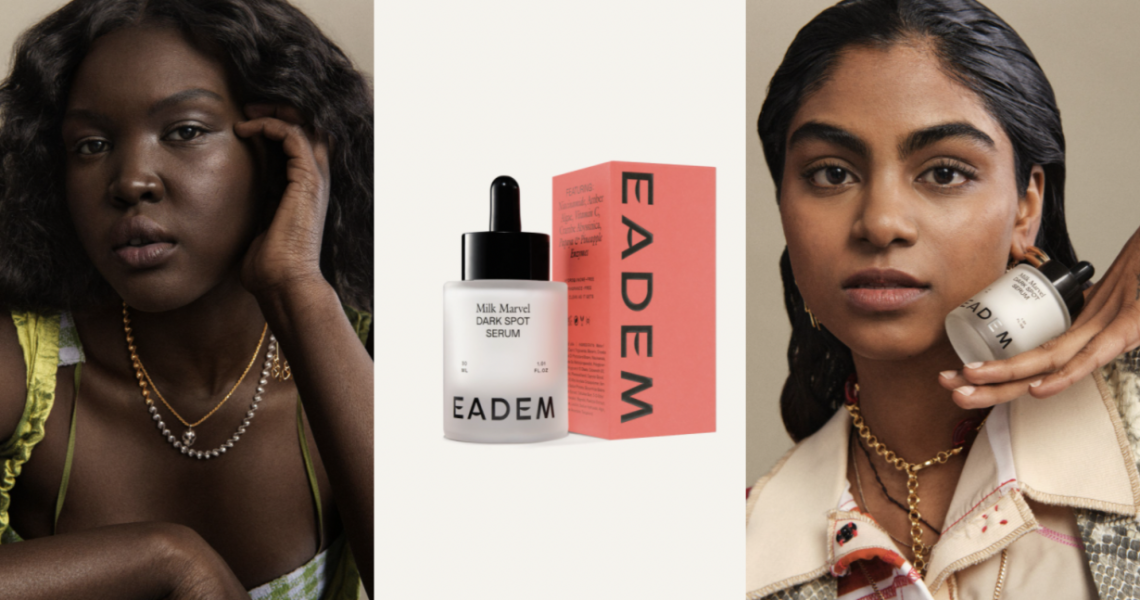A spate of new brands is marketing themselves as being for “melanin-rich skin.”
It’s a decision based on decades of people of color feeling excluded from the beauty market. The history is damning. From drug stores keeping hair products for textured hair behind lock and key to brands offering very narrow ranges of foundation shades, the beauty industry has long been designed for white women. On popular social media accounts like Trendmood, which has 1.6 million followers and chronicles beauty launches, shoppers are consistently vocal about issues of inclusivity. Estee Laundry frequently calls out brands around issues related to diversity, as well.
When it comes to inclusivity in beauty, it’s obvious that textured hair has its own needs and that darker skin requires more nuanced foundation options. Things get a little more complicated, when it comes to skin care. On the one hand, skin is skin. On the other, certain concerns, like hyperpigmentation, are far more prevalent in BIPOC communities. In fact, according to board-certified dermatologist Dr. Ann Brewer, melanin-rich skin is “over 500% more likely” to have hyperpigmentation. Furthermore, concerns around hyperpigmentation are the primary reason members of the BIPOC community visit dermatologists.
On this matter, Dr. Chaneve Jeanitton, board-certified oculofacial plastic surgeon and founder of Epi.logic Skincare, said, “All skin, regardless of skin tone, has the same fundamental needs. Sun protection, antioxidant support, assistance with cell turnover and moisture benefit everyone. But a key difference among skin tones is how melanin-rich skin differs in its response to even mild irritation with hyperpigmentation.”
Skin-care brand Eadem was launched last week, founded by Marie Kouadio Amouzame and Alice Lin Glover, former co-workers at Google. They bonded over a shared love of beauty and frustration at the lack of effective products available for their skin’s needs. Amouzame is West African (from Côte d’Ivoire) but grew up in France, and Glover is Taiwanese American. “As Western women of color, we actually spend more on beauty than anyone else,” Amouzame said. “We really wanted to put products out that will actually work and not waste [customers’] money.”
The brand launched direct-to-consumer with one product, Milk Marvel, a serum made to target dark spots without lightening the rest of the skin. The brand has seen a groundswell of attention, becoming a Glossier Grant Winner for Black-Owned Businesses and being accepted into the Sephora Accelerate Program, all prior to launching. While, of course, they were excited about the press and accolades, the founders also recognized the bittersweet nature of products for a marginalized group gaining attention in the wake of tragedy — the murder of George Floyd.
“I hate seeing this called a ‘trend,’” said Katonya Breaux, founder of Unsun, a line of SPF cosmetics that makes zinc-based sunscreens for darker skin tones (a more clear-cut example of a product where differentiation is required, due to the fact that mineral sunscreens often leave a white cast on darker skin). It is distributed widely, via retailers including Dermstore, Goop, Credo and Nordstrom, among others. “It’s not a ‘trend,’ I think that we have finally been heard and are finally being seen,” she said.
Ad position: web_incontent_pos1
To founders in the category, it’s important to recognize that the need for these products is nothing new. “The numbers have always been there. People of color have always been a majority of the world,” Glover said. The market for the treatment of pigmentation disorders was valued at $5.4 billion dollars in 2018 and is forecasted to reach $10.2 billion by 2026. It’s just that attention from investors and retailers wasn’t there. “For so long, melanin-rich skin was an afterthought,” Jeanniton said.
Breaux is wary of brands being opportunistic in this moment and suddenly showing interest in the melanin-rich community. However, “I can get excited if they truly develop products that could be used in these communities,” she said.
Amouzame sees the benefits of having a number of competitors: “I think the more big companies that can get behind this, the better, because it’s not about just one brand. It’s an international need and a necessity for people like us, so if big companies with big money can put more research behind what our skin needs, that’s absolutely fantastic.” It was only last summer that a medical student took it upon himself to publish a book about skin disease on darker skin, she pointed out. “There’s a lot of progress to be made, and big companies with big budgets can help move the needle significantly.”
On that front, Unilever launched Mele, a skin-care collection co-created with dermatologists of color, in September 2020. Though, of course, it had been in the works long before that. Another new skin-care brand, Ustawi, founded by Natacha Paugam, will pre-launch later this summer with four products: Niacinamide Dark Spot Corrector, Vitamin C Antioxidant Serum, Bamboo Water Protective Mist and Myrtle Leaf Micellar Water Gel.
While the word melanin is often associated with the Black community, Eadem defines melanin-rich broadly, Glover said. “[It’s] a type of skin where they’re consistently able to tan and not burn when they’re exposed to the sun,” she said, though the co-founders said anyone could use the Milk Marvel serum. “Because many people with darker skin tone have more melanin in their skin, we’ve created a product that works for that particular pigment,” Amouzame said.
Ad position: web_incontent_pos2
While there is value in products designed for darker skin tones, there is perhaps just as much value in feeling seen by an industry where these customers have historically felt ignored.




